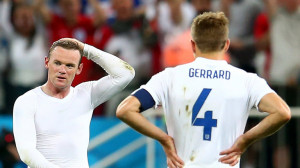 Richard Lutz watches England sadly head home from Brazil but feels American interest rising in The Beautiful Game
Richard Lutz watches England sadly head home from Brazil but feels American interest rising in The Beautiful Game
“I go into a bar and, you know, the sports stations are just showing soccer,” says a friend from the American Deep South. “Not baseball or the NBA or drag racing. But soccer.”
He is bemused. America chews gum to the daily rhythms of the Big Three: baseball, gridiron football and basketball. But slowly the soccer interest is really taking off. Maybe because of Beckham (with his time in Los Angeles and his current interest in owning a Miami franchise); maybe because of the rise of Latino culture in American cities; maybe because of the interest among young kids; or, simply maybe because soccer (or football, to the rest of the world) is a fine old game to watch.
This week, with the US grappling to get out of Group G with an important game versus Germany on Thursday, 20,000 fans showed up in a Chicago park to watch the 2-2 draw against Portugal.
 And the money-oriented Financial Times, quick to assess new trends, highlighted US fever by looking at how the media views its bank balance when it comes to transmitting worldwide matches.
And the money-oriented Financial Times, quick to assess new trends, highlighted US fever by looking at how the media views its bank balance when it comes to transmitting worldwide matches.
It reported that earlier this year, eyes opened wide across the States when NBC whipped the political show Meet The Press off the air to show a live broadcast of Manchester City v West Ham. TV bosses felt the old lady in Peoria Illinois, the urbane businessman in New York, the grand-dad rocking on his chair in Arkansas would rather see Premier league footie than a couple of pols tearing chunks out of each other over Obama-care. As a matter of fact, said the FT, on the final day of the Premier League schedule, NBC dedicated all its ten channels to English football.
Basically they see money in it. And NBC needs to recoup some cash as the terrestrial station paid $250m for a Premier League deal. “Media companies love the sport,” wrote the FT reporter,“because of the mix of people it attracts.” And since viewers like to watch games live, it means advertisers know fans really can’t avoid expensive commercial breaks which they can detour around in a recorded game.
And what the advertisers like, TV bosses love. Fox – owned by Murdoch – holds UEFA rights and its rival, ESPN, has the grip on the World Cup. Follow the cash, TV sports bosses feel. But before America throws itself into touch, it has to be remembered about those rhythms that pound so fiercely in the sports soul of the States.
It has its own beat, its own calendar, its own life that is unknown outside the States. Fans are still arguing about the recent NBA finals, last month’s NFL college draft, the forthcoming baseball All Star game.
The Atlantic magazine writer Derek Thompson commented:
‘There isn’t much evidence that rapt tv audiences from the World Cup will keep watching soccer after the quadrennial championships.’
He points to audience figures to keep things in perspective. In 1996, 1.4m fans watched the American-based Major League Soccer finals on tv. Last year, a mere 0.5m tuned in.
The Beautiful Game may be on the rise. But it has to fight to win hearts in the American landscape.


